Articgate: perpetuating the myth that Arctic sea ice has recovered
Posted on 7 February 2011 by John Cook
In 2009, former astronaut Harrison Schmitt submitted a white paper to NASA, Observations Necessary for Useful Global Climate Models. In this paper, Schmitt crams in an impressive number of skeptic arguments - including the argument that we're currently experiencing cooling:
"How long this cooling trend will persist remains to be seen; however, Greenland glaciers have been advancing since 2006, Artic [sic] sea ice has returned to 1989 levels of coverage, and snowy, cold winters and cool summers have dominated northern North America and Europe"
I'm having trouble getting past the brazenness of using Greenland as evidence of cooling, considering over the last few years, Greenland has been losing over 200 billion tonnes of ice per year. But for now, let's look at Schmitt's argument that Arctic (we'll spell it correctly) sea ice had recovered in 2009. Over 1989, the average sea ice extent was 12.14 million square kilometres. In 2009, the average sea ice extent had fallen to 11.18 million square kilometres. Sea ice coverage was nearly 1 million square kilometres greater in 1989 compared to 2009. How can Schmitt claim sea ice returned to 1989 levels? The Heartland Institute leapt to his defence:
"In fact, National Snow and Ice Data Center records show conclusively that in April 2009, Arctic sea ice extent had indeed returned to and surpassed 1989 levels."
So they're comparing one month in 1989 to another month in 2009. Of all the measurements and data available, what they're looking at is this:
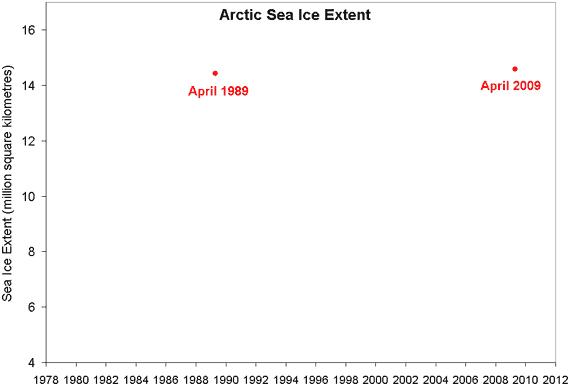
Figure 1: Arctic sea ice extent in April 1989 and April 2009 (NSIDC).
Is this giving you the full picture? There's a lot more to the story than two cherry-picked months. Over the last few decades, Arctic sea ice has shown a steady decline, particularly in summer months when sea ice extent is at a minimum.
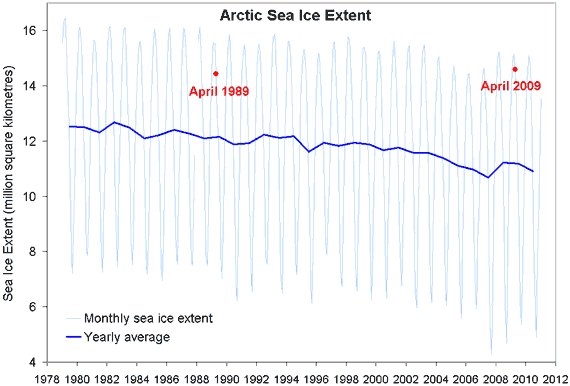
Figure 2: Arctic sea ice extent (light blue is monthly and dark blue is the yearly average) from 1978 to 2010 (NSIDC).
Of course sea ice extent only tells you what's happening on the surface. More importantly, Arctic sea ice has been steadily thinning over the last few decades so the total amount of sea ice is declining. Satellites find that Arctic sea ice was thinning, even in 2008 and 2009 when sea ice extent showed a slight recovery from the 2007 minimum (Giles 2008, Kwok 2009). The total volume of Arctic Sea ice through 2008 and 2009 were the lowest on record (Maslowski 2010, Tschudi 2010).
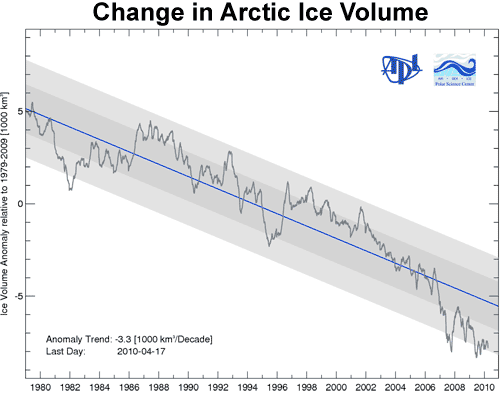
Figure 3: Continuously updated Arctic Sea Ice Volume Anomaly (Polar Ice Center).
To claim Arctic sea ice has recovered in recent years is false. It fails to take into account the overall declining trend in Arctic sea ice extent and more importantly, the fact that the total amount of Arctic sea ice in recent years have been the lowest on record.
UPDATE: A must-read article on this subject is Peter Gleick's Misrepresenting Climate Science: Cherry-Picking Data to Hide the Disappearance of Arctic Ice including a graph that best illustrates the cherry-picking of the Heartland Institute (h/t to Sphaerica):
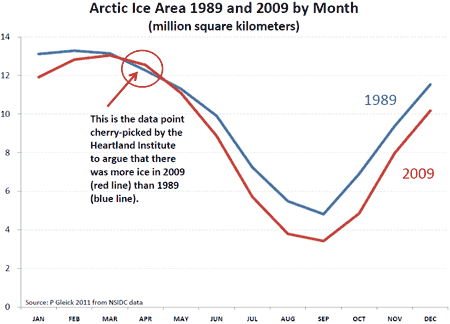
For more takes on this subject, see Scott Mandia, Phil Plait, Chris Mooney, Charlie Petit from Knight Science Journalism Tracker, Lou Grinzo, Richard Littlemore and a new Climate Crocks video by Peter Sinclair. If you want to get it from the horse's mouth, Walt Meier and Mark Serreze from the National Snow and Ice Data Center have submitted an opinion piece to the Santa Fe New Mexican, Arctic sea ice is not recovering.































 Arguments
Arguments























 0
0  0
0 Science: Using all of the data to see the bigger picture.
The Yooper
Science: Using all of the data to see the bigger picture.
The Yooper
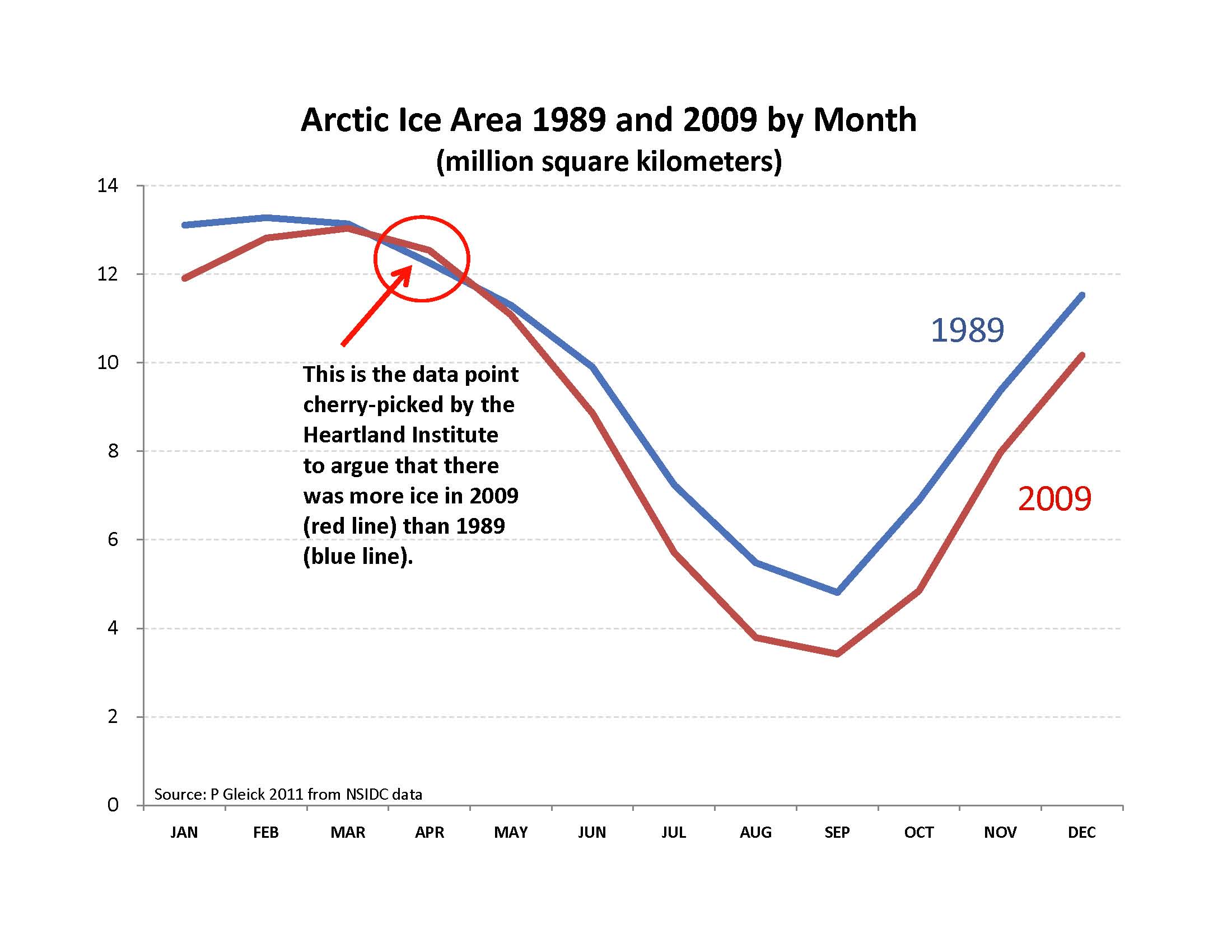 http://images.huffingtonpost.com/2011-02-07-Arcticgateimages1A.jpg
http://images.huffingtonpost.com/2011-02-07-Arcticgateimages1A.jpg

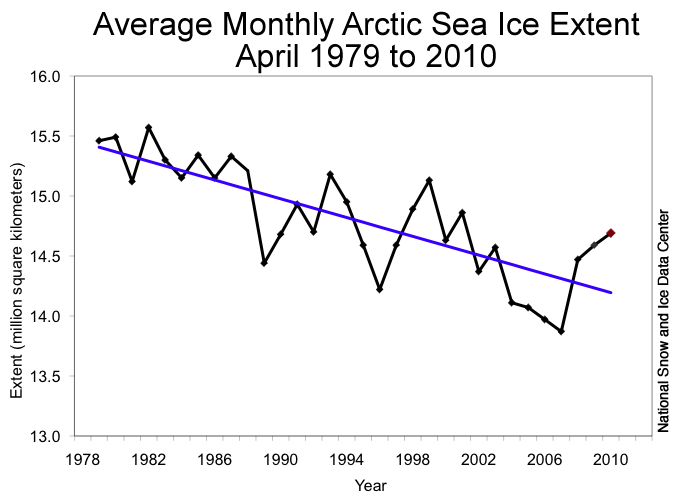
 Can anyone find a cherry to pick from this? The current year is more than 2 stddevs below the average and below 2006-2007, which was the worst year in the record.
Can anyone find a cherry to pick from this? The current year is more than 2 stddevs below the average and below 2006-2007, which was the worst year in the record.







Comments